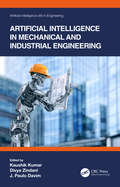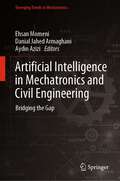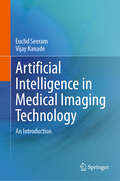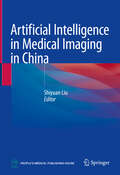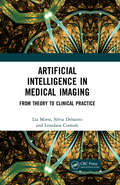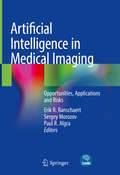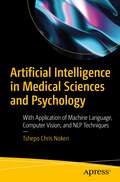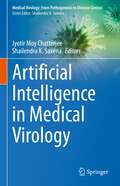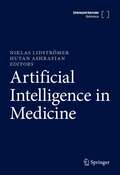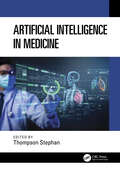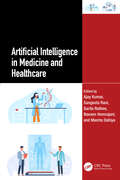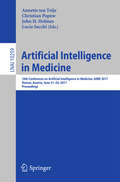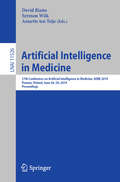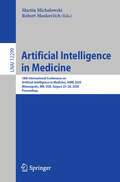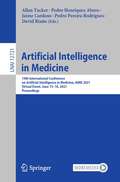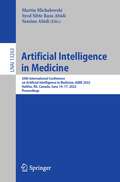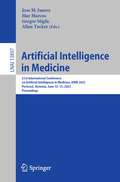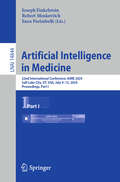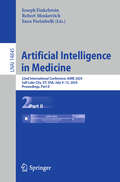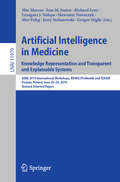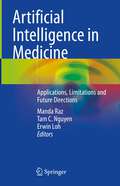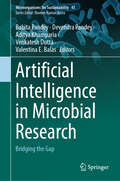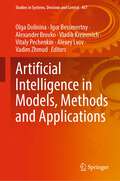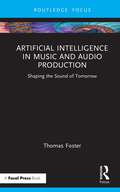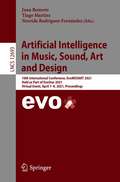- Table View
- List View
Artificial Intelligence in Mechanical and Industrial Engineering (Artificial Intelligence (AI) in Engineering)
by J. Paulo Davim Kaushik Kumar Divya ZindaniArtificial Intelligence in Mechanical and Industrial Engineering offers a unified platform for the dissemination of basic and applied knowledge on the integration of artificial intelligence within the realm of mechanical and industrial engineering. The book covers the tools and information needed to build successful careers and a source of knowledge for those working with AI within these domains. The book offers a systematic approach to explicate fundamentals as well as recent advances. It incorporates various case studies for major topics as well as numerous examples. It will also include real-time intelligent automation and associated supporting methodologies and techniques, and cover decision-support systems, as well as applications of Chaos Theory and Fractals. The book will give scientists, researchers, instructors, students, and practitioners the tools and information needed to build successful careers and to be an impetus to advancements in next-generation mechanical and industrial engineering domains.
Artificial Intelligence in Mechatronics and Civil Engineering: Bridging the Gap (Emerging Trends in Mechatronics)
by Aydin Azizi Danial Jahed Armaghani Ehsan MomeniRecent studies highlight the application of artificial intelligence, machine learning, and simulation techniques in engineering. This book covers the successful implementation of different intelligent techniques in various areas of engineering focusing on common areas between mechatronics and civil engineering. The power of artificial intelligence and machine learning techniques in solving some examples of real-life problems in engineering is highlighted in this book. The implementation process to design the optimum intelligent models is discussed in this book.
Artificial Intelligence in Medical Imaging Technology: An Introduction
by Euclid Seeram Vijay KanadeThis book covers the principles, concepts, and applications of artificial intelligence in medical imaging technologies, specifically in the context of diagnostic imaging, such as radiography and radiological technology. First, artificial intelligence and its subsets machine learning and deep learning are described followed by a discussion of applications of these AI principles in medical imaging technologies. Finally, ethical questions, regulatory aspects, and future trends and challenges are also reviewed in this textbook. This book is intended for both students and practitioners in radiological technology, radiography, radiation therapy, nuclear medicine technology, diagnostic medical sonography, and biomedical engineering technology. Furthermore, residents in radiology, and medical physics students and related healthcare personnel (administrators and managers for example) may find this book useful.
Artificial Intelligence in Medical Imaging in China
by Shiyuan LiuThis book overviews the latest development of Artificial Intelligence in medical imaging in China. Consisted of thirteen chapters, this book discusses development, status, achievements, prospects, visions, bottlenecks, and future challenges affecting development of artificial intelligence in medical imaging from different aspects of government supervision, industrialization, education, academic research and application implementation. It will facilitate better communication between China and foreign countries in all directions of medical imaging AI for all stakeholders.
Artificial Intelligence in Medical Imaging: From Theory to Clinical Practice
by Lia Morra Silvia Delsanto Loredana CorrealeChoice Recommended Title, January 2021 This book, written by authors with more than a decade of experience in the design and development of artificial intelligence (AI) systems in medical imaging, will guide readers in the understanding of one of the most exciting fields today. After an introductory description of classical machine learning techniques, the fundamentals of deep learning are explained in a simple yet comprehensive manner. The book then proceeds with a historical perspective of how medical AI developed in time, detailing which applications triumphed and which failed, from the era of computer aided detection systems on to the current cutting-edge applications in deep learning today, which are starting to exhibit on-par performance with clinical experts. In the last section, the book offers a view on the complexity of the validation of artificial intelligence applications for commercial use, describing the recently introduced concept of software as a medical device, as well as good practices and relevant considerations for training and testing machine learning systems for medical use. Open problematics on the validation for public use of systems which by nature continuously evolve through new data is also explored. The book will be of interest to graduate students in medical physics, biomedical engineering and computer science, in addition to researchers and medical professionals operating in the medical imaging domain, who wish to better understand these technologies and the future of the field. Features: An accessible yet detailed overview of the field Explores a hot and growing topic Provides an interdisciplinary perspective
Artificial Intelligence in Medical Imaging: Opportunities, Applications And Risks
by Erik R. Ranschaert Sergey Morozov Paul R. AlgraThis book provides a thorough overview of the ongoing evolution in the application of artificial intelligence (AI) within healthcare and radiology, enabling readers to gain a deeper insight into the technological background of AI and the impacts of new and emerging technologies on medical imaging. After an introduction on game changers in radiology, such as deep learning technology, the technological evolution of AI in computing science and medical image computing is described, with explanation of basic principles and the types and subtypes of AI. Subsequent sections address the use of imaging biomarkers, the development and validation of AI applications, and various aspects and issues relating to the growing role of big data in radiology. Diverse real-life clinical applications of AI are then outlined for different body parts, demonstrating their ability to add value to daily radiology practices. The concluding section focuses on the impact of AI on radiology and the implications for radiologists, for example with respect to training. Written by radiologists and IT professionals, the book will be of high value for radiologists, medical/clinical physicists, IT specialists, and imaging informatics professionals.
Artificial Intelligence in Medical Sciences and Psychology: With Application of Machine Language, Computer Vision, and NLP Techniques
by Tshepo Chris NokeriGet started with artificial intelligence for medical sciences and psychology. This book will help healthcare professionals and technologists solve problems using machine learning methods, computer vision, and natural language processing (NLP) techniques. The book covers ways to use neural networks to classify patients with diseases. You will know how to apply computer vision techniques and convolutional neural networks (CNNs) to segment diseases such as cancer (e.g., skin, breast, and brain cancer) and pneumonia. The hidden Markov decision making process is presented to help you identify hidden states of time-dependent data. In addition, it shows how NLP techniques are used in medical records classification. This book is suitable for experienced practitioners in varying medical specialties (neurology, virology, radiology, oncology, and more) who want to learn Python programming to help them work efficiently. It is also intended for data scientists, machine learning engineers, medical students, and researchers. What You Will Learn Apply artificial neural networks when modelling medical data Know the standard method for Markov decision making and medical data simulation Understand survival analysis methods for investigating data from a clinical trial Understand medical record categorization Measure personality differences using psychological models Who This Book Is ForMachine learning engineers and software engineers working on healthcare-related projects involving AI, including healthcare professionals interested in knowing how AI can improve their work setting
Artificial Intelligence in Medical Virology (Medical Virology: From Pathogenesis to Disease Control)
by Jyotir Moy Chatterjee Shailendra K. SaxenaThis book comprehensively reviews the potential of Artificial Intelligence (AI) in biomedical research and healthcare, with a major emphasis on virology. The initial chapter presents the applications of machine learning methods for structured data, such as the classical support vector machine and neural network, modern deep learning, and natural language processing for unstructured data in biomedical research and healthcare. The subsequent chapters explore the applications of AI in tackling COVID-19, analysis of the pandemic, viral infection, disease spread, and control. The book further identifies the potential applications of machine learning in the field of virology with a focus on the key aspects of infection: diagnosis, transmission, response to treatment, and resistance. The book also discusses progress and challenges in developing viral vaccines and examines the application of viruses in translational research and human healthcare. Furthermore, the book covers the applications of artificial intelligence-mediated diagnosis and the development of drugs to treat the disease. Towards the end, the book summarizes the ethical and legal challenges posed by AI in healthcare and biomedical research. This book is an invaluable source for researchers, medical and industry practitioners, academicians, and students exploring the applications of AI in biomedical research and healthcare.
Artificial Intelligence in Medicine
by Hutan Ashrafian Niklas LidströmerThis book provides a structured and analytical guide to the use of artificial intelligence in medicine. Covering all areas within medicine, the chapters give a systemic review of the history, scientific foundations, present advances, potential trends, and future challenges of artificial intelligence within a healthcare setting. Artificial Intelligence in Medicine aims to give readers the required knowledge to apply artificial intelligence to clinical practice. The book is relevant to medical students, specialist doctors, and researchers whose work will be affected by artificial intelligence.
Artificial Intelligence in Medicine
by Thompson StephanIn the ever-evolving realm of healthcare, Artificial Intelligence in Medicine emerges as a trailblazing guide, offering an extensive exploration of the transformative power of Artificial Intelligence (AI). Crafted by leading experts in the field, this book sets out to bridge the gap between theoretical understanding and practical application, presenting a comprehensive journey through the foundational principles, cutting-edge applications, and the potential impact of AI in the medical landscape.This book embarks on a journey from foundational principles to advanced applications, presenting a holistic perspective on the integration of AI into diverse aspects of medicine. With a clear aim to cater to both researchers and practitioners, the scope extends from fundamental AI techniques to their innovative applications in disease detection, prediction, and patient care.Distinguished by its practical orientation, each chapter presents actionable workflows, making theoretical concepts directly applicable to real-world medical scenarios. This unique approach sets the book apart, making it an invaluable resource for learners and practitioners alike.Key Features:• Comprehensive Exploration: From deep learning approaches for cardiac arrhythmia to advanced algorithms for ocular disease detection, the book provides an in-depth exploration of critical topics, ensuring a thorough understanding of AI in medicine.• Cutting-Edge Applications: The book delves into cutting-edge applications, including a vision transformer-based approach for brain tumor detection, early diagnosis of skin cancer, and a deep learning-based model for early detection of COVID-19 using chest X-ray images.• Practical Insights: Practical workflows and demonstrations guide readers through the application of AI techniques in real-world medical scenarios, offering insights that transcend theoretical boundaries.This book caters to researchers, practitioners, and students in medicine, computer science, and healthcare technology. With a focus on practical applications, this book is an essential guide for navigating the dynamic intersection of AI and medicine. Whether you are an expert or a newcomer to the field, this comprehensive volume provides a roadmap to the revolutionary impact of AI on the future of healthcare.
Artificial Intelligence in Medicine and Healthcare
by Ajay Kumar Mamta Dahiya Sangeeta Rani Sarita Rathee Naveen HemrajaniThis book is discussing artificial intelligence-based smart systems for diagnosis and prediction of diseases, artificial intelligence in clinical decision-making, and artificial intelligence tools for clinical and healthcare data. It further highlights the importance of 5G and 6G communication for telemedicine applications and applications of machine learning and deep learning in pandemic epidemiology.This book: Discusses artificial intelligence-inspired Internet of Things-based solutions, and machine learning modeling for smart healthcare Explains the use of computer vision, natural language processing in healthcare, and artificial intelligence in clinical decision-making Illustrates the role of artificial intelligence in telemedicine applications Examines medical image analysis using machine learning, and deep learning techniques It is primarily written for senior undergraduates, graduate students, and academic researchers in the fields including computer science and engineering, electronics and communications engineering, and biomedical engineering.
Artificial Intelligence in Medicine: 16th Conference on Artificial Intelligence in Medicine, AIME 2017, Vienna, Austria, June 21-24, 2017, Proceedings (Lecture Notes in Computer Science #10259)
by Annette ten Teije, Christian Popow, John H. Holmes and Lucia SacchiThis book constitutes the refereed proceedings of the 16th Conference on Artificial Intelligence in Medicine, AIME 2017, held in Vienna, Austria, in June 2017.The 21 revised full and 23 short papers presented were carefully reviewed and selected from 113 submissions. The papers are organized in the following topical sections: ontologies and knowledge representation; Bayesian methods; temporal methods; natural language processing; health care processes; and machine learning, and a section with demo papers.
Artificial Intelligence in Medicine: 17th Conference on Artificial Intelligence in Medicine, AIME 2019, Poznan, Poland, June 26–29, 2019, Proceedings (Lecture Notes in Computer Science #11526)
by David Riaño Annette Ten Teije Szymon WilkThis book constitutes the refereed proceedings of the 17th Conference on Artificial Intelligence in Medicine, AIME 2019, held in Poznan, Poland, in June 2019. The 22 revised full and 31 short papers presented were carefully reviewed and selected from 134 submissions. The papers are organized in the following topical sections: deep learning; simulation; knowledge representation; probabilistic models; behavior monitoring; clustering, natural language processing, and decision support; feature selection; image processing; general machine learning; and unsupervised learning.
Artificial Intelligence in Medicine: 18th International Conference on Artificial Intelligence in Medicine, AIME 2020, Minneapolis, MN, USA, August 25–28, 2020, Proceedings (Lecture Notes in Computer Science #12299)
by Martin Michalowski Robert MoskovitchThe LNAI 12299 constitutes the papers of the 18th International Conference on Artificial Intelligence in Medicine, AIME 2020, which will be held online in August 2020. The 42 full papers presented together with 1short papers in this volume were carefully reviewed and selected from a total of 103 submissions. The AIME 2020 goals were to present and consolidate the international state of the art of AI in biomedical research from the perspectives of theory, methodology, systems, and applications.
Artificial Intelligence in Medicine: 19th International Conference on Artificial Intelligence in Medicine, AIME 2021, Virtual Event, June 15–18, 2021, Proceedings (Lecture Notes in Computer Science #12721)
by Jaime Cardoso David Riaño Allan Tucker Pedro Henriques Abreu Pedro Pereira RodriguesThis book constitutes the refereed proceedings of the 19th International Conference on Artificial Intelligence in Medicine, AIME 2021, held as a virtual event, in June 2021. The 28 full papers presented together with 30 short papers were selected from 138 submissions. The papers are grouped in topical sections on image analysis; predictive modelling; temporal data analysis; unsupervised learning; planning and decision support; deep learning; natural language processing; and knowledge representation and rule mining.
Artificial Intelligence in Medicine: 20th International Conference on Artificial Intelligence in Medicine, AIME 2022, Halifax, NS, Canada, June 14–17, 2022, Proceedings (Lecture Notes in Computer Science #13263)
by Martin Michalowski Syed Sibte Raza Abidi Samina AbidiThis book constitutes the refereed proceedings of the 20th International Conference on Artificial Intelligence in Medicine, AIME 2022, held in Halifax, NS, Canada, in June 2022. The 39 full papers presented together with 7 short papers were selected from 113 submissions. The papers are grouped in topical sections on knowledge-based system; machine learning; medical image processing; predictive modeling; natural language processing.
Artificial Intelligence in Medicine: 21st International Conference on Artificial Intelligence in Medicine, AIME 2023, Portorož, Slovenia, June 12–15, 2023, Proceedings (Lecture Notes in Computer Science #13897)
by Allan Tucker Mar Marcos Jose M. Juarez Gregor StiglicThis book constitutes the refereed proceedings of the 21st International Conference on Artificial Intelligence in Medicine, AIME 2023, held in Portoroz, Slovenia, in June12–15, 2023.The 23 full papers and 21 short papers presented together with 3 demonstration papers were selected from 108 submissions. The papers are grouped in topical sections on: machine learning and deep learning; explainability and transfer learning; natural language processing; image analysis and signal analysis; data analysis and statistical models; knowledge representation and decision support.
Artificial Intelligence in Medicine: 22nd International Conference, AIME 2024, Salt Lake City, UT, USA, July 9–12, 2024, Proceedings, Part I (Lecture Notes in Computer Science #14844)
by Robert Moskovitch Joseph Finkelstein Enea ParimbelliThis two-volume set LNAI 14844-14845 constitutes the refereed proceedings of the 22nd International Conference on Artificial Intelligence in Medicine, AIME 2024, held in Salt Lake City, UT, USA, during July 9-12, 2024. The 54 full papers and 22 short papers presented in the book were carefully reviewed and selected from 335 submissions. The papers are grouped in the following topical sections: Part I: Predictive modelling and disease risk prediction; natural language processing; bioinformatics and omics; and wearable devices, sensors, and robotics. Part II: Medical imaging analysis; data integration and multimodal analysis; and explainable AI.
Artificial Intelligence in Medicine: 22nd International Conference, AIME 2024, Salt Lake City, UT, USA, July 9–12, 2024, Proceedings, Part II (Lecture Notes in Computer Science #14845)
by Robert Moskovitch Joseph Finkelstein Enea ParimbelliThis two-volume set LNAI 14844-14845 constitutes the refereed proceedings of the 22nd International Conference on Artificial Intelligence in Medicine, AIME 2024, held in Salt Lake City, UT, USA, during July 9-12, 2024. The 54 full papers and 22 short papers presented in the book were carefully reviewed and selected from 335 submissions. The papers are grouped in the following topical sections: Part I: Predictive modelling and disease risk prediction; natural language processing; bioinformatics and omics; and wearable devices, sensors, and robotics. Part II: Medical imaging analysis; data integration and multimodal analysis; and explainable AI.
Artificial Intelligence in Medicine: AIME 2019 International Workshops, KR4HC/ProHealth and TEAAM, Poznan, Poland, June 26–29, 2019, Revised Selected Papers (Lecture Notes in Computer Science #11979)
by Richard Lenz Mor Peleg Jerzy Stefanowski Grzegorz J. Nalepa Mar Marcos Jose M. Juarez Slawomir Nowaczyk Gregor StiglicThis book constitutes revised selected papers from the AIME 2019 workshops KR4HC/ProHealth 2019, the Workshop on Knowledge Representation for Health Care and Process-Oriented Information Systems in Health Care, and TEAAM 2019, the Workshop on Transparent, Explainable and Affective AI in Medical Systems. The volume contains 5 full papers from KR4HC/ProHealth, which were selected out of 13 submissions. For TEAAM 8 papers out of 10 submissions were accepted for publication.
Artificial Intelligence in Medicine: Applications, Limitations and Future Directions
by Erwin Loh Manda Raz Tam C. NguyenThis book identifies Artificial Intelligence (AI) as a growing field that is being incorporated into many aspects of human life, including healthcare practice and delivery. The precision, automation, and potential of AI brings multiple benefits to the way disease is diagnosed, investigated and treated. Currently, there is a lack of any appreciable understanding of AI and this book provides detailed understandings, which include; foundational concepts, current applications, future challenges amongst most healthcare practitioners. The book is divided into four sections: basic concepts, current applications, limitations and future directions. Each section is comprised of chapters written by expert academics, researchers and practitioners at the intersection between AI and medicine. The purpose of the book is to promote AI literacy as an important component of modern medical practice. This book is suited for all readers as it requires no previous knowledge, it walks non-technical clinicians through the complex ideas and concepts in an easy to understand manner.
Artificial Intelligence in Microbial Research: Bridging the Gap (Microorganisms for Sustainability #45)
by Valentina E. Balas Aditya Khamparia Venkatesh Dutta Devendra Pandey Babita PandeyThis book explores the convergence of microbiology and artificial intelligence (AI) and delves into the intricate world of microbial systems enhanced by cutting-edge AI technologies. The book begins by establishing a foundation in the fundamentals of microbial ecosystems and AI principles. It elucidates the integration of AI in microbial genomics, demonstrating how advanced algorithms analyze genomic data and contribute to genetic engineering. Bioinformatics and computational microbiology are explored, showcasing AI's role in predictive modeling and computational tools. The intersection of AI and microbial applications extends to drug discovery, precision agriculture, and pathogen detection. Readers gain insights into AI-driven drug development, the optimization of agricultural practices using microbial biostimulants, and early warning systems for crop diseases. The book highlights AI's role in microbial biotechnology, elucidating its impact on bioprocessing, fermentation, and other biotechnological applications. Climate-smart agriculture and microbial adaptations to environmental challenges are discussed, emphasizing sustainable practices. This book caters to a diverse audience including teachers, researchers, microbiologist, computer bioinformaticians, plant and environmental scientists. The book serves as additional reading material for undergraduate and graduate students of computer science, biomedical, agriculture, human science, forestry, ecology, soil science, and environmental sciences and policy makers to be a useful to read.
Artificial Intelligence in Models, Methods and Applications (Studies in Systems, Decision and Control #457)
by Vladik Kreinovich Olga Dolinina Alexander Brovko Vitaly Pechenkin Alexey Lvov Vadim Zhmud Igor BessmertnyThis book is based on the accepted research papers presented in the International Conference "Artificial Intelligence in Engineering & Science" (AIES-2022). The aim of the AIES Conference is to bring together researchers involved in the theory of computational intelligence, knowledge engineering, fuzzy systems, soft computing, machine learning and related areas and applications in engineering, bioinformatics, industry, medicine, energy, smart city, social spheres and other areas. This book presents new perspective research results: models, methods, algorithms and applications in the field of Artificial Intelligence (AI). Particular emphasis is given to the medical applications - medical images recognition, development of the expert systems which could be interesting for the AI researchers as well for the physicians looking for the new ideas in medicine. The central audience of the book are researchers, industrial practitioners, students specialized in the Artificial Intelligence.
Artificial Intelligence in Music and Audio Production: Shaping the Sound of Tomorrow
by Thomas FosterIn a time when artificial intelligence (AI) is becoming increasingly integrated into music production, Artificial Intelligence in Music and Audio Production provides a comprehensive and easy-to-understand overview of the latest developments.Artificial Intelligence in Music and Audio Production begins by explaining how AI is already being used in various areas of music production today, from composition and sound design to mixing, mastering, and creating music videos. Practical guides and examples show how anyone can benefit from these new technologies. Whether it’s about generating synthetic vocals, transforming your own voice, or creating complete songs using text prompts—the possibilities are almost limitless. Artificial Intelligence in Music and Audio Production demonstrates to musicians and producers how AI can allow musicians and producers to realize their ideas faster and in more comprehensive ways, ultimately enriching their creative process.This book will be of interest to singers, DJs, music producers, and anyone interested in the future of music—even without a deep technical background.
Artificial Intelligence in Music, Sound, Art and Design: 10th International Conference, EvoMUSART 2021, Held as Part of EvoStar 2021, Virtual Event, April 7–9, 2021, Proceedings (Lecture Notes in Computer Science #12693)
by Juan Romero Tiago Martins Nereida Rodríguez-FernándezThis book constitutes the refereed proceedings of the 10th European Conference on Artificial Intelligence in Music, Sound, Art and Design, EvoMUSART 2021, held as part of Evo* 2021, as Virtual Event, in April 2021, co-located with the Evo* 2021 events, EvoCOP, EvoApplications, and EuroGP. The 24 revised full papers and 7 short papers presented in this book were carefully reviewed and selected from 66 submissions. They cover a wide range of topics and application areas, including generative approaches to music and visual art, deep learning, and architecture.
